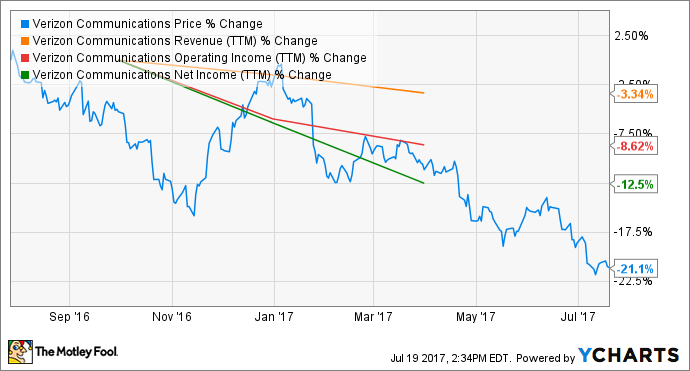After dominating the U.S. wireless market for much of the last decade, Verizon (VZ 0.88%) has fallen on hard times. Revenue and profits are down over the past year, and Verizon's stock has shed more than 20% of its value.
Is Verizon's stock poised for a rebound? Or is this price decline a harbinger of more trouble ahead? The answers to these questions will likely depend on how well Verizon responds to the following challenges.
Pricing pressure
In a largely saturated U.S. wireless market, the major carriers are locked in a battle for market share. Customers must be wrestled away from the competition to spur growth, and the ensuing struggle has ushered in a vicious price war.
After initially resisting pressure from rival T-Mobile (TMUS 0.47%) to offer an unlimited plan, Verizon relented in the face of significant wireless customer losses. Verizon previously chose to compete on the strength of its network, which is widely considered best in class. But that advantage has lessened in recent years, as T-Mobile has steadily improved the quality of its wireless network. In fact, some studies now place T-Mobile's network on par with Verizon's. So Verizon was forced to join its rival in offering customers what they crave most: more data for less money.
Unfortunately, while Verizon's new unlimited plan has helped to stem its customer losses, it's also dented its average revenue per user (ARPU) metrics. That's because many of Verizon's customers who switched to its unlimited plan were paying more for their previous data plans. In turn, this has pressured Verizon's revenue and profitability.
Verizon expects ARPU trends to stabilize later this year, as new customers who come in on its new unlimited plan -- which is more expensive than some of the data plans it previously offered to new subscribers -- are expected to offset the decline from existing customers that lower their bills by switching to unlimited. This is an important trend that bears watching by investors, and one that will go a long way toward determining Verizon's future profitability.

Image source: Getty Images.
Cord-cutting
Verizon may not be the first company that comes to mind when thinking about those most impacted by the rising number of cable cancellations, but with its FiOS business still accounting for about 10% of its total revenue, it's a serious threat nonetheless.
Cord-cutting appears to be accelerating, as the plethora of online streaming video services such as Netflix, Amazon Prime Video, and Hulu is making it easier for more people to go without traditional cable TV. This trend is likely to only get worse for cable providers, as 10.8 million more customers are expected to cut the cord over the next five years -- up from 1.9 million in 2016 -- according to research group SNL Kagan.
That's bad news for Verizon, whose FiOS TV segment has long been a source of growth. Recently, however, Verizon has begun to bleed customers -- including 13 million FiOS video subscribers in the first quarter -- as cord-cutting's impact has worsened.
In response to these trends, Verizon sold off some of its FiOS assets in April of last year, sparking some analysts to wonder if it would be best served by exiting the pay TV business altogether. Yet for the time being at least, it appears that Verizon intends to keep its remaining FiOS assets.
Verizon intends to counter cord-cutting by launching its own streaming service later this year. Of note, however, is that Verizon's previous attempts at online video have not gone well, and over-the-top video services typically carry lower profit margins than traditional cable. Worse still, Verizon's new streaming video offering is likely to at least partially cannibalize its existing FiOS TV business, although that's probably better than Verizon having its lunch eaten by its competitors.
On a more positive note, Verizon's online video services would not be bound by the same regional constraints of its FiOS infrastructure, thereby allowing it to offer its streaming package on national basis. Yet there's likely to be fierce competition in this crowded arena, and rivals Sling TV and DirecTV Now already have a sizable head start. Still, having a competitive streaming service should only grow in importance as more and more consumers ditch their traditional pay TV packages in the years ahead. That makes Verizon's success in the streaming wars another area that investors should monitor closely.






